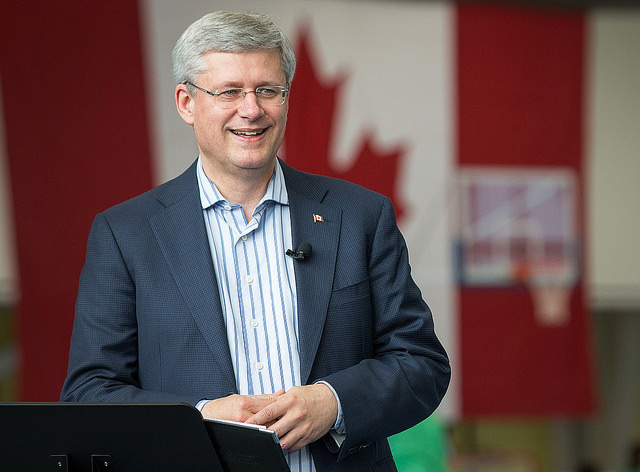There are lots of conservative groups in Canada that have been granted charitable status, the Fraser Institute being an obvious example. That means they’re required to be non-partisan and can use only 10 per cent of their resources for political activities. Besides broad ideology, what these groups have in common is that none of them, it appears, is being audited by the Canadian Revenue Agency. Yet many have unquestionably participated in “political activities” as spelled out by the CRA. You can read all about them, and their warm relationships with the Harper government, in Prof. Donald Gutstein’s new book, Harperism: How Stephen Harper and His Think Tank Colleagues Have Transformed Canada.
Then there are the more or less progressive equivalents of these charitable groups, like the Canadian Centre for Policy Alternatives (CCPA) and the David Suzuki Foundation. Most are quite small. What 52 of them have in common is that virtually all (that we know of) have been critical of certain Harper government policies and all are being audited by the CRA, often in a highly intrusive, time-consuming way.
The government somehow found an extra $13.4-million for the CRA to audit charities to ensure they were using tax dollars properly. As far as anyone can tell, all the new funds have been used to audit the government’s critics, none to audit its friends. The first wave of such audits mostly focused on environmental groups, but the net was later widened to include anti-poverty, international aid and human rights groups that drive the Conservatives — and apparently the CRA — crazy.
It sure sounds like an open and shut case of intimidating the government’s critics. Yet the CRA insist that the government plays no role in its auditing decisions. It claims that “the process for identifying which charities will be audited for any reason is handled by the Charities Directorate of the CRA alone in a fair and consistent way.”
If that’s true, what can we say about the many audits of the progressives and the non-audits of the Conservatives? That it’s a heck of a coincidence? That it’s just the way the auditing cookie crumbles? Or that it’s a deliberate device by the Harper government to violate the vaunted neutrality of the CRA in order to punish progressive groups in Canada?
What can we make of the CRA warning the Kitchener-Waterloo Field Naturalists, 300 nature lovers in southern Ontario, that they’re at risk of breaking the rules limiting so-called political or partisan activities? Here’s a coincidence: They had just written to two Harper ministers complaining about government-approved chemicals that damage bee colonies.
What about agency officials informing Oxfam Canada that “preventing poverty” was not an acceptable goal? “Relieving poverty is charitable,” they wrote, “but preventing it is not. Preventing poverty could mean providing for a class of beneficiaries that are not poor.” Oxfam’s executive director, Robert Fox, called it “absurd,” though insane seems closer to the mark. Maybe it’s another coincidence that Jason Kenney has criticized Oxfam for its opposition to Israeli settlements in the West Bank.
Indeed the Harper government has never hidden its opposition for certain charities, like the very ones the CRA has chosen to audit. For a while, for example, outrageous attacks on “radical” environmental groups that opposed new pipelines became de rigueur for members of the Harper government.
There’s a scandal within a scandal here as well. While the CRA is disrupting the work of often tiny NGOs, the government is simultaneously laying off international tax auditors who specialized in investigating the tax avoidance strategies of one-percenters and corporations. Tax dollars lost to the public treasury are estimated in the multi-billions, which is why the G20, including Canada, has formally made cracking down on tax evasion a priority. Except when it’s not.
In countries that respect the rule of law, tax auditing is an activity that must be undertaken with the most scrupulous impartiality. Then there was disgraced U.S. president Richard Nixon, the sinister mastermind behind Watergate. Nixon, as one of his senior aides wrote, wanted “to use the available federal machinery to screw our political enemies.” That included siccing the Internal Revenue Service on them.
But Nixon’s plan was foiled. The IRS commissioner simply refused to co-operate. Yet in Canada, CRA audits of the Conservative government’s known enemies now appear to be almost routine.
Everyone knows that Stephen Harper too has a long enemies list. So the question isn’t why the government is going after those enemies. It’s how they’re getting away with it. Is the CRA carrying out dirty tricks for the government, as seems to be happening? According to its website, the CRA’s corporate values are professionalism, respect and integrity, all of which are violated by pursuing those the government can’t tolerate.
Why is this not considered Canada’s own Auditgate scandal? Why is there not a massive protest against the CRA from those who are not yet being singled out? Where is the business community, the legal community, the mainstream media? If today’s enemies are progressive charities, who knows who they could be tomorrow? First they came for progressives…
This article originally appeared in the Globe and Mail.
Image: Flickr/PMWebphotos



